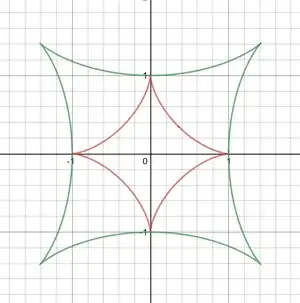Continued on with @Henno_Brandsma y expression, and let $s=\sin\theta, c=\cos\theta$:
$y = 2\sin 2\theta \cos \theta - \sin\theta \cos 2\theta = 4s(1-s^2)-s(1-2s^2) = 3s-2s^3$
Substitute back to equation 1:
$cx = \cos(2\theta) + s(3s-2s^3) = (2c^2-1)+(1-c^2)(1+2c^2)=3c^2-2c^4$
$$x = 3c-2c^3$$
We want even powers for s and c, so that we can use identity, $s^2 + c^2 = 1$
$x^2 = (3c-2c^3)^2 = \large 2 - {3(2c^2-1)^2 \over 2} + {(2c^2-1)^3\over2}=2-{3\cos^2(2\theta)\over 2}+{\cos^3(2\theta) \over2}$
$y^2 = (3s-2s^3)^2 = \large 2 - {3(2s^2-1)^2 \over 2} + {(2s^2-1)^3\over2}=2-{3\cos^2(2\theta)\over 2}-{\cos^3(2\theta) \over2}$
$$x^2-y^2 = \cos^3(2\theta)$$
$$x^2+y^2 = 4-3\cos^2(2\theta)$$
$$\cos^6(2\theta)=(x^2-y^2)^2=\left({4-x^2-y^2 \over 3}\right)^3$$
$$y^6+(3x^2+15)y^4 + (3x^4-78x^2+48)y^2+(x^6+15x^4+48x^2-64)=0$$
